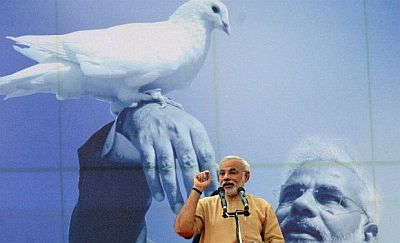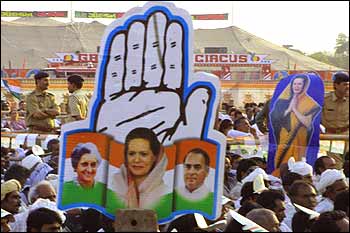 Human rights group Amnesty International on Wednesday criticised the Narendra Modi-led government, saying under the new regime India has witnessed a rise in communal violence and its Land Acquisition Ordinance has put thousands of Indians at "risk" of forcible eviction.
Human rights group Amnesty International on Wednesday criticised the Narendra Modi-led government, saying under the new regime India has witnessed a rise in communal violence and its Land Acquisition Ordinance has put thousands of Indians at "risk" of forcible eviction.
In its Annual Report 2015, released in London, Amnesty highlighted poll-related violence in the lead up to the May 2014 General Elections, communal clashes and failure of consultation on corporate projects as key concerns.
"National elections in May saw a government led by the Bharatiya Janata Party come to power with a landslide victory. Prime Minister Narendra Modi, who campaigned on promises of good governance and development for all, made commitments to improve access to financial services and sanitation for people living in poverty.
"However, the government took steps towards reducing requirements to consult with communities affected by corporate-led projects," Amnesty said in its report.
The report highlighted that, "the authorities continued to violate people's rights to privacy and freedom of expression. There was a rise in communal violence in Uttar Pradesh and some other states and corruption, caste-based discrimination and caste violence remained pervasive."
In reference to communal violence, it noted that, "A string of communally charged incidents
"...In December, Hindu groups were accused of forcibly converting several Muslims and Christians to Hinduism," the report said.
The rights body also went on to single out the Land Acquisition Ordinance for criticism as it described the move as a new "risk" to thousands of Indians.
"In December, the government passed a temporary law which removed requirements related to seeking the consent of affected communities and assessing social impact when state authorities acquired land for certain projects," it said.
"Thousands of people remained at risk of being forcibly evicted from their homes and lands for large infrastructure projects. Particularly vulnerable were Adivasi communities living near new and expanding mines and dams," it added.
While the group recognised "progressive legal reform", it was critical of India's "overburdened and under-funded criminal justice system".
Amnesty pointed out two court orders as important "gains" for India in 2014, including a Bhopal court's decision in November to demand that its criminal summons against the Dow Chemical Company to be re-issued and a "landmark judgement" by the Supreme Court in April granting legal recognition to transgender people.











 © 2025
© 2025